
Woman at microscope
Image: Daniel Hofmann- Biological, pharmaceutical, chemical, and biotechnological industries
- Research and teaching at institutions of higher education
- Non-university research institutions
- National and regional institutions conducting research in the fields of agriculture, forestry, fisheries science, horticulture, water and soil management
- Administration / authorities: environmental protection and nature conservation organizations, facilities dedicated to human and veterinary medicine, museums, botanical and zoological gardens
- Environmental protection / consulting
- Nature and landscape planning (mapping, reporting, ecological assessments)
Furthermore, the following natural science master's degree programmes are offered:
Biochemistry M.Sc.
Biogeosciences M.Sc.
Chemical Biology M.Sc.
Geography - Climate and Environmental Change M.Sc.
Molecular Medicine M.Sc.
Business Administration for Engineers and Natural Scientists M.Sc.
-
University entrance qualification
A university entrance qualification, such as a general secondary school leaving certificate, is required for admission onto the study programme.
More information on university entrance qualifications can be found here.
-
Language requirements
The study programme is taught in German. You must therefore have a very good command of German at the start of the study programme.
Dornburger Straße 159
07743 Jena
Google Maps site planExternal link
Bachstr. 18
07743 Jena
Opening hours:
Thursdays (13:00-15:00) and by appointment
Bachstraße 18 k (1.OG)
07743 Jena
Google Maps site planExternal link
Opening hours:
see homepage
Neugasse 24
07743 Jena
Google Maps site planExternal link
University Main Building / SSZ
Fürstengraben 1
07743 Jena
Google Maps site planExternal link
Office hours:
We offer consultations in person, by telephone, and via Zoom. You can make an appointment by calling us on +49 3641 9-411111 (Mondays to Fridays from 9:00 to 11:00) or outside these office hours on +49 3641 9-411200. You can also use our remote help desk.
Consultation hours:
Mondays, Tuesdays, Thursdays and Fridays (9:00 to 12:20), Tuesdays (14:00 to 18:00), and Wednesdays and Thursdays (14:00 to 16:00).
Video chat: To the video chat – Zoom Videochat ZeitenMondays to Fridays (12:30 to 13:00) Password ZSB2020 Data protection informationpdf, 101 kb
University Main Building, Room E065
Fürstengraben 1
07743 Jena
Google Maps site planExternal link
Opening hours:
Mondays (10:00 – 12:00)
Tuesdays (13:00 – 15:00)
Wednesdays (10:00 – 12:00)
Thursdays (13:00 – 15:00)
Fridays (10:00 – 12:00)
You can also use our remote help desk at
www.uni-jena.de/service-ssz
or send us your enquiries by post.
Telephone hours:
Mondays to Fridays
(9:00 – 11:00)
Postal address:
Friedrich-Schiller-Universität Jena
Studierenden-Service-Zentrum
07737 Jena
University Main Building
Fürstengraben 1
07743 Jena
Google Maps site planExternal link

